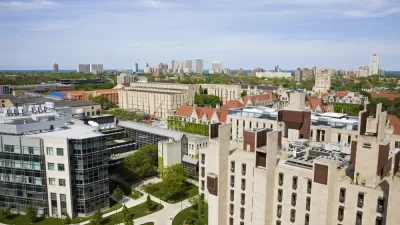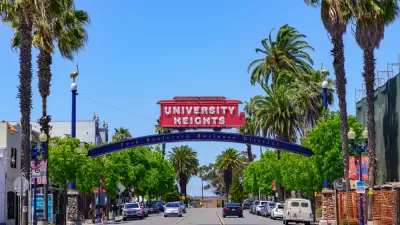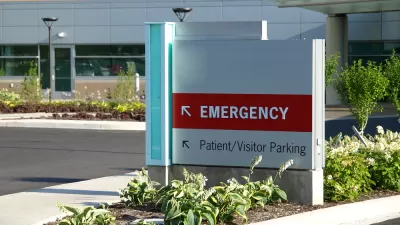Halfway completed, the University of Chicago's $250 million community redevelopment project ditches the oft-contentious town-gown relationship for a strategy of local investment and economic development, to the benefit of both.
Comprised of a 600,000 sf mixed-use project, historic theater restoration, and the renovation of several retail properties, the University of Chicago's "once in a generation" effort to revive the 53rd Street corridor, north of its Hyde Park campus, follows a national trend of "urban colleges and universities serving as redevelopment engines for their surrounding communities," reports Robert Sharoff.
"It's enlightened self-interest for us," said David Greene, an executive vice president at the university. "We've always
been very competitive when it comes to providing a great intellectual
community. But we found there was something missing when we looked at
the quality of life for students and faculty who are used to the kinds
of amenities you find in places New York, Boston and Palo Alto."
"Mr. Greene added that revitalizing 53rd Street is part of a larger
effort by the university to rethink its relationship with the
neighborhood, which sits on the lakefront about six miles south of
downtown Chicago," notes Sharoff.
"Over the years and particularly in the 1950s and '60s, there was a lot
of development aimed at creating a barrier around the campus," Greene said.
"We're now trying to reverse that trend."
FULL STORY: University of Chicago Works on Its Neighborhood

Planetizen Federal Action Tracker
A weekly monitor of how Trump’s orders and actions are impacting planners and planning in America.

Maui's Vacation Rental Debate Turns Ugly
Verbal attacks, misinformation campaigns and fistfights plague a high-stakes debate to convert thousands of vacation rentals into long-term housing.

Restaurant Patios Were a Pandemic Win — Why Were They so Hard to Keep?
Social distancing requirements and changes in travel patterns prompted cities to pilot new uses for street and sidewalk space. Then it got complicated.

In California Battle of Housing vs. Environment, Housing Just Won
A new state law significantly limits the power of CEQA, an environmental review law that served as a powerful tool for blocking new development.

Boulder Eliminates Parking Minimums Citywide
Officials estimate the cost of building a single underground parking space at up to $100,000.

Orange County, Florida Adopts Largest US “Sprawl Repair” Code
The ‘Orange Code’ seeks to rectify decades of sprawl-inducing, car-oriented development.
Urban Design for Planners 1: Software Tools
This six-course series explores essential urban design concepts using open source software and equips planners with the tools they need to participate fully in the urban design process.
Planning for Universal Design
Learn the tools for implementing Universal Design in planning regulations.
Heyer Gruel & Associates PA
JM Goldson LLC
Custer County Colorado
City of Camden Redevelopment Agency
City of Astoria
Transportation Research & Education Center (TREC) at Portland State University
Jefferson Parish Government
Camden Redevelopment Agency
City of Claremont





























